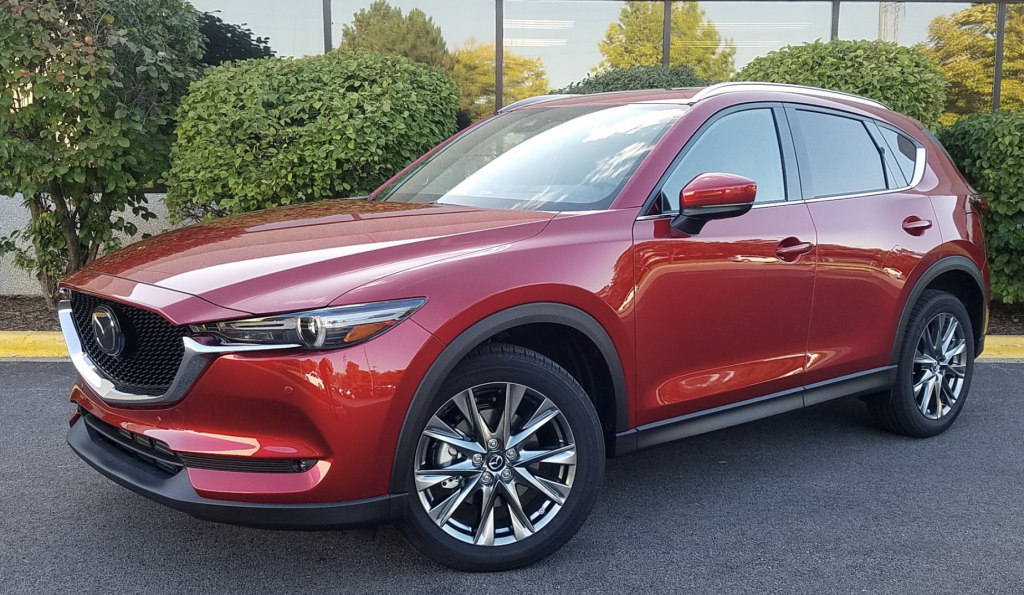
2019 Mazda CX-5 Diesel Signature AWD
Class: Compact Crossover
Miles driven: 1160
Fuel used: 38.0 gallons
| CG Report Card | |
|---|---|
| Room and Comfort | B- |
| Power and Performance | B- |
| Fit and Finish | A |
| Fuel Economy | B+ |
| Value | B- |
| Report-card grades are derived from a consensus of test-driver evaluations. All grades are versus other vehicles in the same class. Value grade is for specific trim level evaluated, and may not reflect Consumer Guide's impressions of the entire model lineup. | |
| Big & Tall Comfort | |
| Big Guy | B |
| Tall Guy | A- |
| Big & Tall comfort ratings are for front seats only. "Big" rating based on male tester weighing approximately 350 pounds, "Tall" rating based on 6'6"-tall male tester. | |
| Drivetrain | |
| Engine Specs | 168-hp 2.2L |
| Engine Type | 4-cylinder turbodiesel |
| Transmission | 6-speed automatic |
| Drive Wheels | AWD |
Real-world fuel economy: 30.5 mpg
Driving mix: 25% city, 75% highway
EPA-estimated fuel economy: 27/30/28 (city/highway/combined)
Fuel type: Diesel
Base price: $41,000 (not including $1045 destination charge)
Options on test vehicle: Premium paint ($595), cargo mat ($70), illuminated door sill trim plates ($40), rear-bumper guard ($125), retractable cargo cover ($250), roof rack ($400), trailer hitch with wiring harness ($450)
Price as tested: $44,335
Quick Hits
The great: Ride/handling combination
The good: Fuel economy, comfortable and luxurious interior
The not so good: Complicated control layout, cost of turbodiesel option
More CX-5 price and availability information
CG Says:
It was a bit of deja-vu, but with a twist … or maybe a rattle.
Last spring we tested a nearly identical 2019 CX-5 — an AWD Signature in Soul Red — but this one was different under the hood. Whereas the previous CX-5 had a 2.5-liter turbocharged four with 250 horsepower and 310 lb-ft of torque, this one had Mazda’s long-awaited turbodiesel engine, a 2.2-liter four rated at 168 horsepower and 290 lb-ft of torque.
That engine swap results in a price jump of $3945 over a 2020 model-year CX-5 Signature AWD with the regular gasoline powerplant (at this point, Mazda hasn’t said whether the diesel CX-5 will continue into the 2020 model year). Regardless, nearly $4000 is a rather stiff upcharge for a diesel engine of this size. So how is it justified?
First is with fuel economy. The Skyactiv D 2.5-liter turbo gets an EPA rating of 22 city/27 highway/24 combined, whereas the turbodiesel’s is 27/30/28 — or +5 mpg in the city, +3 on the highway, for a combined rating that improves by about 17 percent. (Our fuel-economy difference was even greater than that — on the order of 30 percent — though we did more city driving in the gas version.) However, that’s on diesel fuel, which currently costs about 10 percent more than gasoline. (Mazda says it can run on 85-percent Biodiesel, a benefit in some areas.) It also requires Diesel Exhaust Fluid (DEF), though it’s estimated that it can go 10,000 miles between fills of the 3.5-gallon DEF tank … and DEF fluid doesn’t cost much if you buy it and fill the tank yourself.
But there’s also a trailer-towing advantage. With the 2.5 turbo, the CX-5 is rated to tow 2000 lbs, but with the turbodiesel, it’s 3500 lbs — which is among the highest tow ratings for a compact crossover.
Test Drive: 2019 Toyota RAV4 Adventure
Diesel engines are traditionally noisier than gas ones, emitting a telltale “clatter,” particularly at idle and under acceleration. Although modern diesels are much quieter, this one still produced some clatter at idle (heard more outside the vehicle than inside), along with a different — though not necessarily louder — noise under acceleration. Under cruise conditions, however, it was rarely noticed.
2018 Los Angeles Auto Show: 2019 Subaru Crosstrek Hybrid
Like many small turbodiesels, flooring the throttle from a stop resulted in timid acceleration at first, with a quick, linear buildup as turbo boost came in. The transmission kicked down fairly quickly when the throttle was stabbed at speed, though response wasn’t particularly strong.
Quick Spin: 2019 Honda CR-V Touring
In other ways, this Mazda CX-5 Diesel was nearly identical to the 2019 gas model tested, so we invite you to read that report for more details. But in summary, this one impressed with a 180-degree rearview camera that allowed a 360-degree view with a simple touch of a screen button, along with a fine ride/handling balance, decent passenger space, ritzy interior furnishings, and a host of high-end features. Yet it suffered from the same control complexity common to all Mazdas, along with cargo space that is on the small side for a compact crossover.
While the CX-5 has long been one of our Best Buys in the compact-crossover class — and continues to be for 2020 — the turbodiesel version is a little tough to justify. Yes, it gets better fuel economy that results in lower fuel cost and greater driving range, but rival hybrid offerings — such as the Toyota RAV4 Hybrid and new-for-2020 Ford Escape and Honda CR-V Hybrids — do even better. And yes, it has a much higher towing capacity. But the fuel-economy benefit will take years to pay back the added initial expense, leaving the greater towing capacity to be the major reason for enduring the diesel’s “voice.”
Check out our Compact Crossover Best Buys
Follow Consumer Guide on Twitter
Mazda CX-5 Diesel